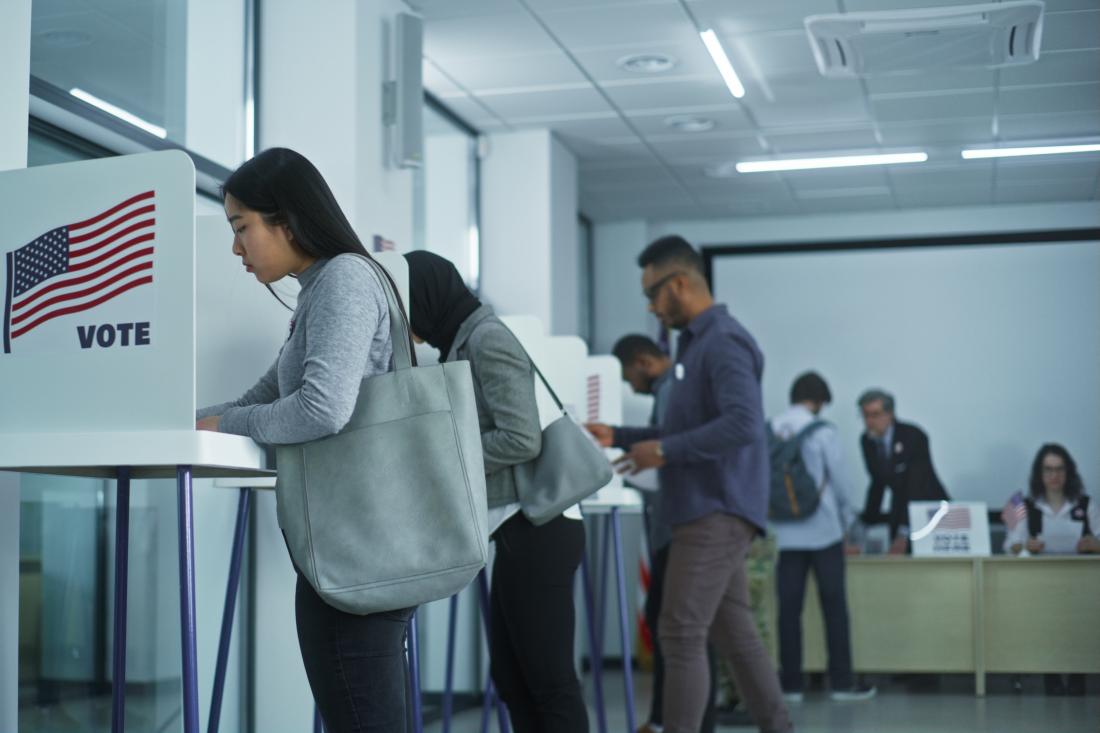Personality Traits and Responses to Persuasive Appeals among Voters in the United States
- Voters
- Electoral participation
- Voter Behavior
- Nudges and reminders
Personality traits such as extraversion or openness may affect how individuals respond to campaigns to increase voter participation and turnout. Researchers used two randomized evaluations, an online survey and a field experiment, to test how personality traits affect responses to persuasive appeals to vote. They found that individuals with high levels of openness were most responsive to a range of appeals.
Policy issue
The share of eligible voters who participate in elections has declined in the United States over the last half-century. In response to this trend, campaigns have sought to find the most effective tactics to increase voter turnout. Some research has examined the effectiveness of different messages that encourage citizens to vote, like appealing to voters' sense of civic duty or applying social pressure, and different methods of contact, like mass mailings, phone calls, or in-person canvassing. Other research examines how an individual's core personality traits explain differences in rates of political participation. However, there is little evidence that links different personality traits to how individuals respond to various mobilization tactics.
Context of the evaluation
Personality traits such as extraversion, agreeableness, conscientiousness, emotional stability, and openness are commonly used in psychology to measure an individual's core personality. Known as the Big Five, these personality traits go beyond cultural barriers, unlike other attitudes, values, and identities that may define an individual's personality. They are also less likely to change throughout an individual's lifetime. These broad dimensions of personality are associated with specific characteristics:
- Extraversion includes characteristics such as sociability, energy, assertiveness, and positive emotionality
- Agreeableness includes characteristics such as altruism, tender-mindedness, trust, and modesty
- Conscientiousness includes characteristics such as organization, thoroughness, and attention to detail
- Emotional stability includes characteristics such as even-temperedness, calmness, and lack of anxiety
- Openness includes characteristics such as imagination, curiosity, and insight

Details of the intervention
Researchers conducted an internet-based survey experiment and a field experiment to investigate whether the Big Five personality traits affect responses to different messages intended to mobilize voters.
In advance of the 2010 midterm election, researchers recruited 801 respondents who had voted in the 2008 general election using Amazon.com' s MTurk interface.1 Respondents first answered a set of questions designed to measure levels of the Big Five traits. Next, participants were randomly assigned to receive one of the following four messages:
- Social pressure message: voters in this group received a message reminding them that whether or not people vote is a matter of public record
- Civic duty message: voters in this group received a message emphasizing that in a democracy, it is citizens' obligation to participate
- Instrumental benefits message: voters in this group received a message highlighting that some elections are decided by relatively few votes and that the participant might have the opportunity to affect an election outcome
- Comparison group: participants did not receive any of the voter mobilization appeals
Finally, participants were asked how likely they were to vote in the upcoming election.
Researchers also used evidence from a field experiment conducted prior to the 2006 primary election for state governor in Michigan. In that experiment, registered voters were randomly assigned to one of five groups: four groups were sent different mailings encouraging them to vote, including a social pressure message which told recipients that a record of whether or not the recipient had voted would be sent to the recipient and their neighbors after the election. The fifth group served as the comparison group and did not receive any of the mailings. In 2009, researchers randomly selected participants from the social pressure and comparison groups and administered a telephone survey to measure their underlying personality traits. They combined this information with publicly available voting records to evaluate how personality traits influenced the effectiveness of the social pressure treatment.
Results and policy lessons
Researchers found that the Big Five personality traits affected participants' responses to various voter mobilization appeals in both experiments. In particular, individuals with high levels of openness responded favorably to many different appeals, while those with high levels of the other four traits responded favorably to fewer message types.
In the online survey, researchers found that the social pressure treatment was less effective at mobilizing individuals with high levels of extraversion, agreeableness, and conscientiousness but more effective among individuals with high levels of emotional stability and openness. The civic duty appeal was less effective among individuals with high levels of conscientiousness and more effective among individuals with high levels of emotional stability. Individuals with high levels of openness were the only ones who responded positively to the instrumental benefits message.
In the field experiment, researchers found that Big Five personality traits affected responses to the social pressure message in one-voter households. The social pressure treatment was most effective at mobilizing individuals who had high levels of openness. It was also effective for individuals with high levels of emotional stability. These results did not hold in two-voter households, suggesting that having the opportunity to discuss the messages with another individual, often someone with different levels of the Big Five traits, can also affect how individuals respond to voter mobilization appeals.
Amazon MTurk (www.mturk.com) is an online marketplace that allows internet users to earn money for performing tasks that require human intelligence, such as transcribing audio recordings, rating images, or completing surveys. Researchers paid respondents $0.25 to participate in this evaluation.

